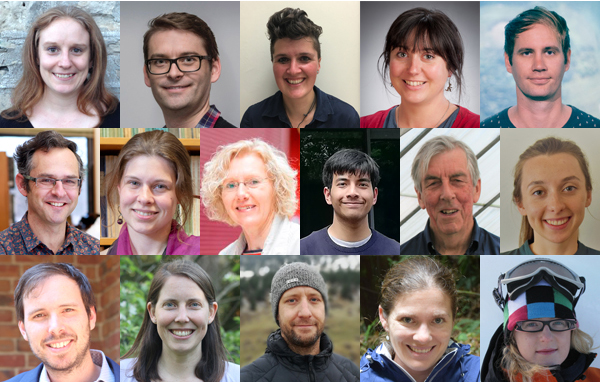News
Published 25 October 2018Fellowships and scholarships support researchers across spectrum of their careers

Three researchers recognised for their sustained research excellence and 13 highly promising researchers at the early stages of their careers have been awarded fellowships and scholarships today.
The three established researchers receiving prestigious James Cook Research Fellowships will be supported to undertake study or research in their field of endeavour for two years.
Professor Tony Merriman FRSNZ, University of Otago, will research the genetic causes of gout and related diseases in Aotearoa New Zealand. He will examine the genome of Māori and Pacific populations to gain understanding of the role that inherited genetic variations play for the risk of developing metabolic disease.
Associate Professor Renate Meyer, University of Auckland, will use complex statistical methods to separate gravitational-waves signal from background noise in astronomical observations. This will enable us to better observe and understand some of the most mysterious aspects of our universe, such as the coalescence of black holes, or collision of neutron stars.
Professor Stephen Wratten FRSNZ, Lincoln University, will address threats to bee populations and their pollination efficacy. He will examine the nutrients and chemistry of flower pollens consumed by bees, and use this information to develop science-based drinking water. His research can provide world-class management protocols to ensure our bee populations remain healthy and productive.
The James Cook Research Fellowships are administered by Royal Society Te Apārangi on behalf of the New Zealand government.
The Royal Society Te Apārangi Rutherford Foundation Trust also announced three PhD scholarships and ten postdoctoral fellowships.
Two-year New Zealand Postdoctoral Fellowships have been awarded to:
- Dr Benjamin Albert, University of Auckland, for research entitled: “Omega-3 fats during overweight and obese pregnancy, for metabolic protection of the offspring”.
- Dr Alana Alexander, University of Otago, for research entitled: “Hologenomics for conservation: a first test of utility”.
- Dr Kendon Bell, Manaaki Whenua Landcare Research, for research entitled: “Empirical measurement of the impact of climate change: correcting for measurement error in precipitation and understanding the incidence of impacts.”
- Dr Nicola Day, Auckland University of Technology, for research entitled: “Assessing and predicting ecosystem-level resilience and vulnerability to global change.”
- Dr Bella Duncan, Victoria University of Wellington, for research entitled: “Antarctic climate and flora in a warmer world: A geological perspective using molecular fossils.”
- Dr Rebecca Gladstone-Gallagher, University of Auckland, for research entitled: “Assessing the role of biodiversity in maintaining coastal ecosystem health in the Anthropocene.”
- Dr Matthew Nitschke, Victoria University of Wellington, for research entitled: “Molecular cartography of coral-symbiotic algae in 3D.”
- Dr Christina Painting, University of Auckland, for research entitled: “Understanding the interacting effects of precopulatory and postcopulatory selection on reproductive success using the New Zealand giraffe weevil.”
- Dr Oliver Wigmore, Victoria University of Wellington, for research entitled: “Improving understanding of debris-covered glacier dynamics, Haupapa/Tasman Glacier, New Zealand.”
- Dr Victoria (Holly) Winton, Victoria University of Wellington, for research entitled: “How did marine primary production in the Ross Sea change over the past 2000 years?”
Three-year Cambridge Rutherford Memorial PhD Scholarships have been awarded to:
- Mr Rakesh Arul, University of Auckland, for research entitled: “Bonds with light - Can quantum optics be used to control chemistry?”
- Ms Rachael Baxter, University of Otago for research entitled: “Investigation of timescales and processes of basaltic magma during storage.”
- Ms Georgia Nixon, University of Auckland for research entitled: “Classical complexity verification of quantum computations.”
These scholarships allow the researchers to complete at PhD at the University of Cambridge in the UK.
Royal Society Te Apārangi President and Chair of the Rutherford Foundation Trust, Professor Wendy Larner FRSNZ, said the Society was pleased to award fellowships and scholarships to these outstanding researchers who are at varying stages of their careers.
“The Society seeks to support all New Zealanders to explore, discover and share new knowledge. We look forward to hearing what these talented researchers uncover with their research.”
The Royal Society Te Apārangi Rutherford Foundation Trust receives financial support from the Ministry of Business, Innovation and Employment and the Cambridge Commonwealth, European and International Trust.
